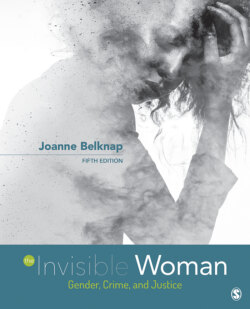Читать книгу The Invisible Woman - Joanne Belknap - Страница 16
На сайте Литреса книга снята с продажи.
Women and Girls as Victims
ОглавлениеSection III of this book focuses on the victimization of women and girls. The most common crimes committed against women and girls—sexual abuse (including rape), intimate partner abuse (domestic violence), and stalking—are not only some of the most invisible and underreported crimes, but they are also some of the most frequent, abusive, fear-inducing, humiliating, and often, violent and dangerous, crimes.
Research on violence against women and girls, also known as gender-based abuse, has also increased exponentially in recent years. This is in part due to the increased number of women and feminists in academia and has been greatly aided by the implementation of the federal Violence Against Women Act (VAWA) of 1994, the first U.S. federal legislation addressing gender-based abuse (Murshid & Bowen, 2018). VAWA was signed into law by President Clinton in 1994, and the Office on Violence Against Women was established in 1995 to implement this act, and it was reauthorized in 2000, 2005, and 2013 (Stuart, 2005; Valente, Hart, Zeya, & Malefyt, 2001; Whittier, 2016). Due to VAWA, research on violence against women (e.g., domestic violence, sexual assault, and stalking) has been funded, and programs in a variety of agencies (e.g., police, courts, Native American communities) regarding violence against women have been implemented and funded at unprecedented rates (Stuart, 2005). VAWA 2000 included a substantial expansion of protections for immigrant victims of domestic violence and sexual assault and was passed with the Victims of Trafficking and Violence Protection Act of 2000 (Murshid & Bowen, 2018). The 2013 reauthorization of VAWA was passed only after being critically threatened by a partisan standstill primarily due to Republicans’ reluctance to expand the program to gay, lesbian, bisexual, and trans victims and undocumented immigrants and reticence to increase authority to American Indian tribes to address intimate partner abuse in their communities (Deer, 2018; Whittier 2016). The VAWA 2013 debates were fraught with both sexist and racist rhetoric, framing “the racialized ‘criminal alien’ sexually threatening to the ‘vulnerable’ woman” (Mayers, 2019, p. 61). Immigrants were dichotomized into “deserving” and “undeserving” of citizenship, in efforts to enhance border control with Mexico (Mayers, 2019, p. 61).
The VAWA reauthorization needed in 2018 expired due to the U.S. federal government shutdown under President Trump (December 2018–January 2019). In April 2019 the U.S. House of Representatives passed a VAWA Reauthorization bill, including trans victims and banning convicted domestic violence abusers from purchasing guns, but at the date of writing this, it has not been considered by the U.S. Senate.
